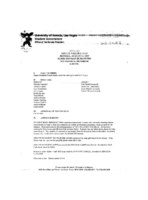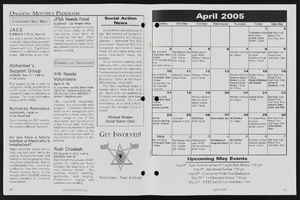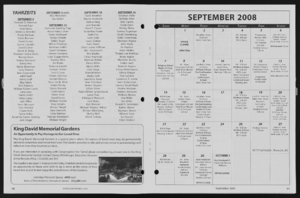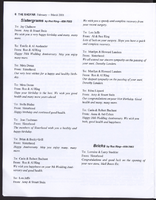Search the Special Collections and Archives Portal
Search Results

David Ober interview, October 11, 2017: transcript
Date
Archival Collection
Description
Tucson, Arizona, native David Ober moved to Las Vegas twice. He arrived reluctantly the first time in 1978 with his parents as a high-school student, when his father, Hal Ober, came to Las Vegas to begin building and marketing the U.S. Home (now Lennar) brand. While the elder Ober soon left U.S. Home to open his own home-building business, R.A. Homes, his youngest child left Las Vegas shortly after his high school graduation to return to his native Tucson, follow in the footsteps of his siblings, and attend the University of Arizona. After graduating from the University of Arizona David Ober opened his own mortgage company and began building a life in Phoenix. In the late 1980s he agreed to take a large pay cut, return to Las Vegas, and learn his father's business from the ground up. At the time, Hal Ober was developing his award-winning, master-planned community, Desert Shores. David Ober, the youngest of the five children of Hal and D'Vorre (Dee) Ober, agreed to participate in the
Text

Transcript of interview with John L. Houck by Perry L. Smith, March 14, 1981
Date
Archival Collection
Description
On March 14, 1981, collector Perry L. Smith interviewed police officer, John L. Houck, (born May 11th, 1944 in Butte, Montana) in his home in Las Vegas, Nevada. This interview offers an overview of the history of Las Vegas and insider details on early Las Vegas police work. The interview concludes with a discussion on Henderson and Boulder City.
Text
Richard Ronzone Photographs
Identifier
Abstract
The Richard Ronzone Photographs depict Las Vegas, Nevada storeowner and politician Richard “Dick” Ronzone and his family from 1920 to 1989 and 2001. The photographs primarily depict Ronzone at Ronzone’s Store in Las Vegas, at events with politicians such as Nevada Governor Paul Laxalt, or at the Las Vegas Valley Water District. The photographs also depict Ronzone during his service with the Nevada National Guard; portraits of Ronzone, his wife Ann Roeth Ronzone, and his mother Bertha Ronzone; and events during Ronzone’s tenure as a Clark County Commissioner from 1972 to 1980.
Archival Collection
Johnny LaVoie Papers on the Culinary Workers Union Local 226
Identifier
Abstract
The Johnny LaVoie Papers on the Culinary Workers Union 226 (1958-1993) contain photographs of Culinary Union meetings; Culinary Union strikes at the MGM Hotel, Frontier Hotel, and other Las Vegas, Nevada hotels; agreements; by-laws; and Culinary Union collective bargaining booklets. Also included are negatives that correspond to the photographs, audiovisual material, newsletters from the Culinary Union and Catering Industry Employees, pins, buttons, and postcards.
Archival Collection
Wilbur and Toni Clark Papers
Identifier
Abstract
The Wilbur and Toni Clark Papers date from 1944 to 1991, with the bulk from 1953 to 1963 and document the lives of Wilbur and Toni Clark in Las Vegas, Nevada and the development of the Desert Inn Hotel and Casino. The collection includes correspondence from Wilbur Clark to those he identified as important individuals including government officials and celebrities. It also includes materials related to Clark’s plan of building luxury apartments near the Desert Inn, and newspaper clippings and scrapbooks about the Clarks and the Desert Inn. The collection contains some audiovisual materials including Wilbur and Toni Clark's home movies, news footage, and film footage of Las Vegas, Nevada and the Desert Inn.
Archival Collection

Meeting minutes for Consolidated Student Senate University of Nevada, Las Vegas, August 14, 1995
Date
Archival Collection
Description
Text

University of Nevada, Las Vegas (UNLV) 22nd commencement program
Date
Archival Collection
Description
Commencement program from University of Nevada, Las Vegas Commencement Programs and Graduation Lists (UA-00115).
Text



